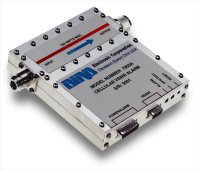The Bird Model 7005A Series VSWR Monitor is designed for long-term VSWR
monitoring and power measurement in analog or digital cellular, PCS, paging, and two-way
radio systems. The 7005A can be used at any point in the transmission system, including
the main antenna feed line, after the combiner.
A high-directivity coupler and microprocessor control provide state-of-the-art accuracy
and versatility. VSWR is calculated from forward and reflected power measurements, and
compared to an internally settable VSWR threshold of 1.3 to 1.8.
The 7005A Series features an RS-232 compatible interface for connection to a notebook or
host computer for readout of forward and reflected power and control of alarm functions.Alarm Action
When the line VSWR exceeds the threshold, the 7005A Series will initiate one of the
following actions based upon the degree of mismatch:
- VSWR less than the set point: no alarms are activated.
VSWR equals or slightly exceeds the
set point: additional
measurements are accumulated to
determine a trend. If reflected power increases during this time, an alarm condition is
generated. If reflected power is stable, an alarm is generated if VSWR exceeds the
threshold for more than thirty seconds.
VSWR greatly exceeds the set point:
an alarm is generated
immediately.
Alarm conditions are indicated by a red LED on the monitor, and the activation of a form C
relay. Normally open, common, and normally closed relay contacts are available at the
Alarm/Power connector. The relay is a "fail safe" type which automatically
enters the alarm state if supply power is lost.
Reset Operation
Alarms may be reset through any of three actions:
- A Local Reset button located on the monitor.
- A TTL-compatible Remote Reset pin located on the Alarm/Power connector. This method will reset the unit up to three times before a local reset is
required.
- Remote Reset through the RS-232 interface.
Up to three remote resets are possible before a local reset is necessary.
Specifications
Frequency
Ranges: Two models cover 824-960 MHz and 1800-2100 MHz.
Forward Power Measurement
Type: Average reading.
Power Measurement Range: 824-960 MHz: 25 W to 500 W.
1800-100 MHz: 2.5 W to 25 W.
Accuracy: ± 5% of reading, ± 1 count.
Maximum Input Power: 750 W average, 3.0:1 VSWR.
Insertion
Loss: 824-60 MHz: 0.12 dB maximum.
1800-100 MHz: 0.15 dB maximum.
VSWR: 824-60 MHz: 1.07:1 maximum.
1800-100 MHz: 1.15:1 maximum.
Reflected Power Measurement
824-960
MHz: 2.5 W to 50 W average.
1800-2100 MHz: 0.25 W to 25 W average.
Directivity: 30 dB minimum.
VSWR Alarm Characteristics
Set points and
(Accuracy):1.3 (± 10%), 1.5 (± 5%), or 1.8 (± 5%).
Relay Contact Type: Dry, Form C. Relay contacts:
COMMON, N.O., N.C.
Contact Rating: 100Vdc @ 0.5 A.
Visual Alarm: Red LED illuminates to indicate an alarm condition.
Stimulus: VSWR set point exceeded, response time proportional to overload.
Reset: Local mechanical reset switch. Remote input (Reset @ 0 to +0.8
Vdc).
Interface Port
Connector: Female DB-9, compatible with IBM PC AT serial port.
Protocol: Serial RS-232, 9600 baud, no parity, 8 data bits, 1 stop bit, no handshake.
Physical and Environmental Specifications
General:
Thruline ® sensor for direct insertion
in 50-ohm line.
RF Connectors:
Type N(M) in, N(F) out.
Alarm/Power
Connector: 15-pin female 5 "D" shell.
Operating Temperature: 0 to 50° C.
Storage Temperature: -20° C to 80° C.
Humidity: 0 to 95% maximum (non-condensing).
Altitude: Up to 3000 m above sea level.
Passive Intermod Products: less than -130 dBc.
Power Requirements: +16 to +28 Vdc @ 0.1 A or less.
Dimensions (excluding connectors): 5.0" ) H 5 4.6") W 5 1.3") D
(12.7 cm 5 11.7 cm 5 3.3 cm) .
Weight: less than 2 lb. (0.45 kg).
- Compatible with analog or digital cellular, PCS, paging, and two-way radio systems.
- Two models: 824–960MHz and
1800–2100 MHz.
- Can automatically shutdown transmitting
equipment based on abnormal VSWR.
- True average measurement of forward and reflected power from 25 to 500 watts.
- Low insertion loss, high directivity (30dB min.), and extremely low intermod distortion (less than -130dBc)
|
|
